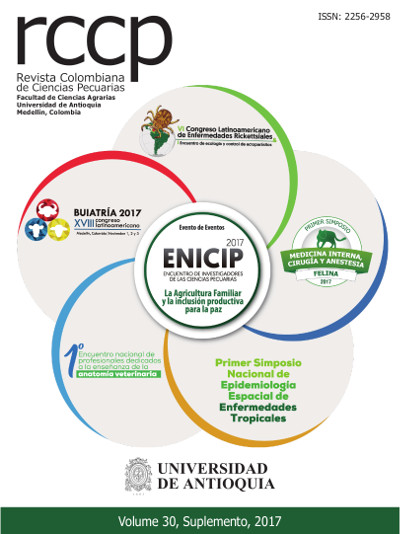Implications of family livestock production in food security in México
DOI:
https://doi.org/10.17533/udea.rccp.330555Resumo
Data from the Food and Agriculture Organization of the United Nations (FAO) indicate that 70% of the world’s poorest people live in rural areas and depend on agriculture and livestock as their main income. The increased food demand, degradation of natural resources, and the serious effects of climate change seriously threaten their livelihood. Under this context of demand, food prices are becoming increasingly inaccessible to rural populations, especially those with a greater degree of marginalization or social backwardness; which compromises their warranty of having healthy and high-quality food. There is a potential in family-based production in the Mexican rural environment, which may address appropriately this problem of food availability at a lower cost, in order to reduce the issues of poverty, hunger and inequity that encourage the persistent migration of people from the countryside to large cities or to the United States of America. Unwarranted feeding is a complex problem that must be addressed from a strategy arranged upon agreement by all actors and canalized through comprehensive action plans. These plans should be circumscribed in the scope of sustainable production, which includes the development of various agricultural production systems, either in large, medium or small scale; and which, of course, include family or backyard production.
Downloads
Referências
Ciccarese L, Silli V . The role of organic farming for food security: Local nexus with a global view. Future of food. J Food Agric Soc 2016; 4(1).
González F, Pérez A, Ocampo I, Paredes JA, de la Rosa P. Contribuciones de la producción en traspatio a los grupos domésticos campesinos. Tesis de Posgrado. El Colegio de Posgraduados campus Puebla. 2013. [Access date: Julio, 2017] URL: http://www.ciad.mx/archivos/revista-eletronica/RES44/Floriberto_Gonzalez.pdf
Instituto Nacional de Estadística y Geografía (INEGI). 2007. [Access date: Mayo, 2017] URL: http://www.beta.inegi.org.mx/proyectos/agro/agricola/2007/
López PE, Pro MA, Cuca GJM, Pérez HP. Ganadería de traspatio en México y seguridad alimentaria situación actual y perspectivas. III Foro Internacional “Ganadería de Traspatio y Seguridad Alimentaria”, El Colegio de Postgraduados Campus Veracruz. Fundación Produce Veracruz Oct. 18-19, 2012, México.
López JL, Damián MA, Álvarez F, Parra F, Zuluaga G. La economía de traspatio como estrategia de supervivencia en San Nicolás de los Ranchos, Puebla, México . Rev Geog Agr 2015: 48-49/51.
Organización de las Naciones Unidas para la Agricultura y la Alimentación (FAO). Movilización de recursos para garantizar el derecho a la alimentación. 2002. [Access date: Octubre, 2017] URL: http://www.fao.org/WorldFoodSummit/sideevents/papers/y6667s.htm
Urquía-Fernández N. La seguridad alimentaria en México. Salud Pública Mex 2014; 56(Sup 1):92-98.VII Censo Agropecuario . La ganadería familiar en México. 1ª ed . México DF . INEGI, El Colegio de Posgraduados. 1991 . ISBN 970-13-1813-7.
Downloads
Publicado
Como Citar
Edição
Seção
Licença
Os autores autorizam a RCCP a reimprimir o material nela publicado.
A revista permite que o(s) autor(es) detenham os direitos autorais sem restrições, e permitirá que o(s) autor(es) mantenham os direitos de publicação sem restrições.






